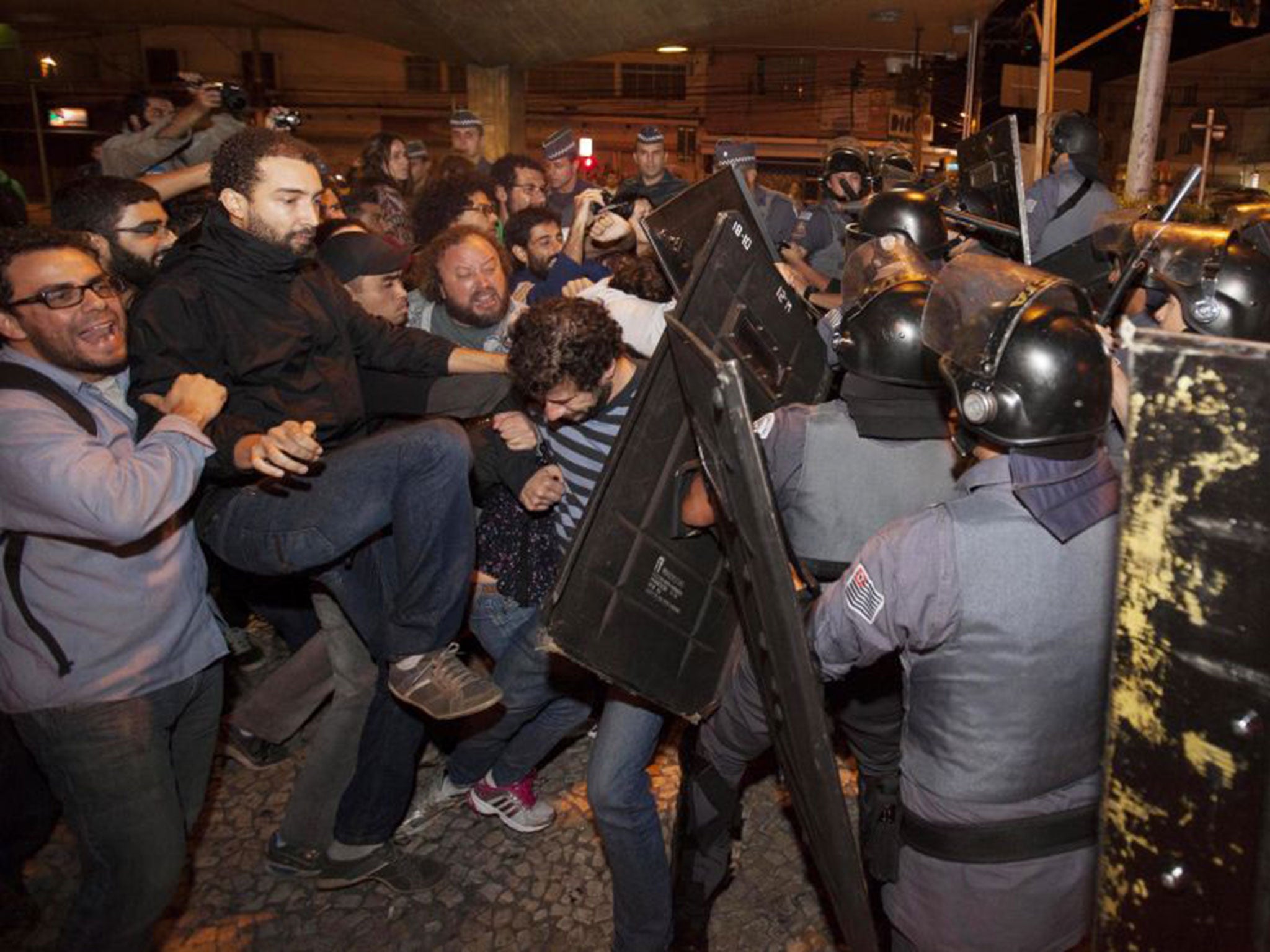The Independent's journalism is supported by our readers. When you purchase through links on our site, we may earn commission.
World Cup 2014: Riots, strikes and traffic jams cloud Sao Paulo's big kick-off
City gripped by serious political problems rather than football fever

“The whole world is cheering in Sao Paulo” reads the first World Cup banner to greet those arriving in Brazil’s business capital for a month-long football carnival. It did not take long for that notion to be reduced to dust yesterday.
Beyond the first few Neymar posters dotting the fringes of Guarulhos airport – the striker is on so many of them in Brazil that they call it “Neymarketing” – lay the tip of the tailback which reduced the city to a very desperate form of gridlock. It was the fifth day of the metro workers’ strike, presenting the local TV networks with a novel statistic: the total length of Sao Paulo traffic jams.
By 9.30am it was a 170km (106-mile) matrix of gridlock, rendering the city’s motorists immobile and keeping the police force busy three days before Brazil kick off the tournament against Croatia here. Officers pointed guns at protesters, threatening to achieve with rubber bullets what tear gas had not entirely accomplished as workers took to the streets in their hundreds. News footage captured the evidence of a dismal night: an overturned bus in flames, smashed shop windows. This is not how the World Cup kick-off was meant to be.
Good luck to the government officials who must try to bring this strike to an end by Thursday or risk the opening day being one of the most chaotic we have known. The metro workers are asking for a 20 per cent pay rise. Employers at the state-owned network are offering 8 per cent. This story and its consequences enveloped the broadcast bulletins, with the Brazil team’s impending football business limited to the frilly story of how an eight-year-old boy had run on to the pitch during their training session and been adopted by Neymar and Co after the guards had tried to throw him out.
Football is struggling to be heard in many ways. This country might be desperate to win the World Cup after Uruguay stole it away when the tournament was last staged here 64 years ago, but it feels no debt of gratitude to Fifa for giving them the opportunity to stage the event.
You might have expected the Sao Paulo papers to be awash with blanket coverage of Luiz Felipe Scolari’s team – the tactics, the opponents, the hopes, the girlfriends – but it is the lack of all that which is most striking. With a mere 72 hours to go, this tournament’s greatest value seems to be the outlet it provides for expression of the wrongs and ills which prevail in the country nearly 30 years after the fall of the military dictatorship.
Poverty is a part of the discontent, complicated as it is in this vast city by the sense of a growing alienation between the even more penniless north of the country and Sao Paulo, the place to which northerners once flocked to find work. There were plenty of people around to tell you yesterday that those up north now stay “in their beds” when the bolsa familia social security is handed out.
However, it is what they call the “disappearing money” which people most detest – the kickbacks, the fraudulent billing, the payments for favours given. Those with a sense of perspective about how the city is lagging behind say that endemic corruption is at the root of everything. “The money’s gone into back hands instead of roads and infrastructure,” said one taxi driver yesterday morning. They even have an expression for the concept here – rouba, mas faz (roughly, “It’s OK to steal if you get things done”).
Everyone knows that the “disappearing money” has been lost without trace in football, too. There is an incredible sense of consistency for people between the stories of Fifa delegates allegedly taking secret payments that helped Qatar win the 2022 World Cup and the prosaic reality of day-to-day life in their own country. For many Brazilians, Sepp Blatter seems to epitomise all the men – the cartelas or “top hats” to use the pejorative term – who have run domestic football into the ground here.
The corruption is the reason why democracy has earned a bad name among even some well-educated people. “When we had the [military] dictatorship, we had more things for the people,” said one. “I know those days could be brutal but if you were upstanding there were no problems. In the democracy, people are helping themselves to what they want.”
As officials have helped themselves to a little money here, a little there, the prospect of Brazil doing its reputation some good by staging this World Cup is turning to dust before the eyes of the people. Everywhere you looked last night there was evidence of the last-ditch scramble to get the Arena Corinthians ready: scaffolded walkways, graffiti no one has had time to paint out and taped-off areas deemed unsafe to pass beyond. The ground would also not meet British safety standards as organisers have not tested it at anywhere near full capacity.
Brazilians wait with bated breath – not so much to see if their country can walk away with the trophy as to discover if it can get away with staging this event.
Subscribe to Independent Premium to bookmark this article
Want to bookmark your favourite articles and stories to read or reference later? Start your Independent Premium subscription today.

Join our commenting forum
Join thought-provoking conversations, follow other Independent readers and see their replies